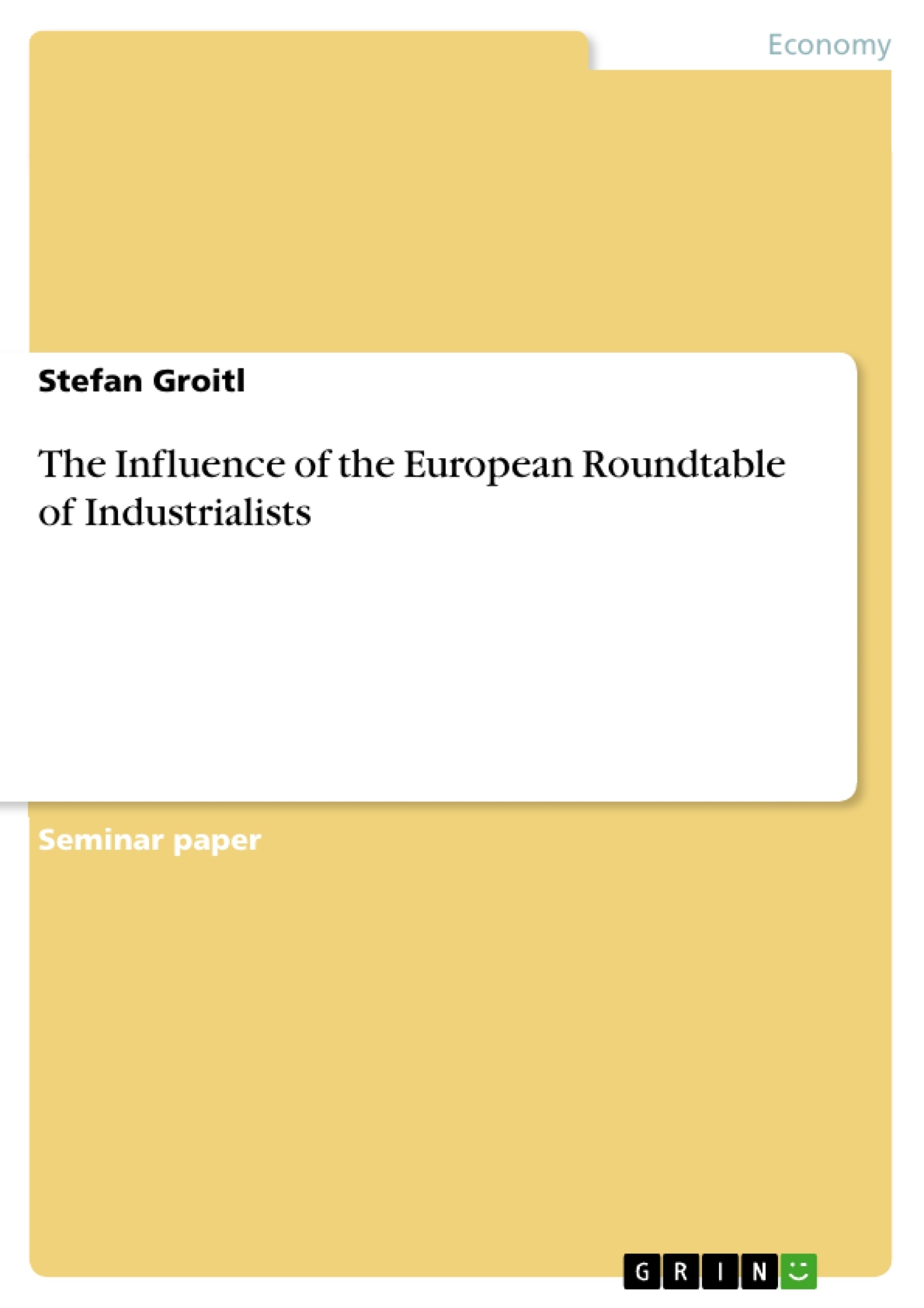There are around 1,000 business associations organized and addressed to the European Union (EU) level, which correspond to two-thirds of all EU groups (Greenwood, 2007, p.49). There is a wide range of these business groups, from unique and exclusive businesswide clubs of multinational firms (MNF) through to highly specialist interest organisations (Greenwood, 2007, p.49). The mobilisation of collective action from multinational firms is one of the most important developments in the EU and is a signal of new influential political actors at EU level (Cowles, 1998, p.108). This essay tries to outline what the European Roundtable of Industrialists (ERT) is exactly, how it was founded and whether they have substantial influence, and if so, why and how they organise it.
One of the most important and influential businesswide clubs is the European Roundtable of Industrialists, which is representing around 45 multinational firms of European parentage (Cowles, 1998, p.108; Nollert, 2005, p.299). They describe themselves neither as a business lobby group, nor as a think tank (ERT, 2011). The members cover a wide range of industrial and technological sectors and are situated all over Europe (ERT, 2011). Important member firms are for example Unilever, Nestlé, Siemens, ThyssenKrupp, Philipps, Bayer and BMW (ERT, 2011; Spindler, 2002, p.17). Together they have sales figures of more than 1,000 billion Euros, provide around 6.6 million jobs (ERT, 2011) and are responsible for huge investments, not only in Europe (Richardson, 2000, p.10). The secretariat is now based in Brussels and is regularly publishing articles on different pan-European subjects (Nollert, 2005, p.299). The main concern of the ERT is the creation of conditions necessary to improve European growth and jobs (ERT, 2011).
Inhaltsverzeichnis (Table of Contents)
- What is the European Round Table of Industrialists?
- ERT history
- Influence of the ERT
Zielsetzung und Themenschwerpunkte (Objectives and Key Themes)
This essay aims to define the European Round Table of Industrialists (ERT), examine its origins, and analyze its influence within the European Union (EU). The text explores the factors that contribute to the ERT's power and examines its organizational structure and decision-making processes.
- The role and influence of business organizations at the EU level
- The motivations and strategies of multinational firms in European integration
- The ERT's objectives and impact on EU policy
- The nature of collective action and the provision of public goods in the EU
- The evolving relationship between business and politics in a globalized world
Zusammenfassung der Kapitel (Chapter Summaries)
What is the European Round Table of Industrialists?
The European Roundtable of Industrialists (ERT) is a prominent businesswide club representing approximately 45 multinational firms based in Europe. The ERT focuses on promoting European economic growth and job creation by advocating for policies that support competition, free market integration, and neoliberal deregulation. Its members, including prominent companies like Unilever, Nestlé, Siemens, and BMW, contribute significantly to the European economy through sales, employment, and investment. The ERT distinguishes itself from traditional lobbying groups and think tanks, emphasizing a strategic and visionary approach to shaping the EU policy agenda.
ERT history
The ERT emerged in 1983 in response to a perceived lack of communication between European industry and EU policymakers. Led by Pehr Gyllenhammar of Volvo, a group of industrialists sought to bridge the gap between the business world and the political sphere by providing a platform for dialogue and collaboration. The ERT's history is marked by its commitment to addressing pressing economic challenges and advocating for a more integrated and competitive European market.
Schlüsselwörter (Keywords)
The text focuses on the European Roundtable of Industrialists (ERT), its influence on EU policy, and the broader context of business and politics in the European Union. Key themes include multinational firms, business organizations, collective action, public goods, free market integration, neoliberal deregulation, European integration, and EU policy.
Frequently Asked Questions
What is the European Roundtable of Industrialists (ERT)?
The ERT is an exclusive group representing around 45 major European multinational firms. It aims to promote economic growth and competitiveness within the European Union.
When was the ERT founded and by whom?
The ERT was founded in 1983, led by Pehr Gyllenhammar of Volvo, to bridge the communication gap between European industry and EU policymakers.
Which famous companies are members of the ERT?
Prominent members include companies such as Unilever, Nestlé, Siemens, ThyssenKrupp, Bayer, and BMW.
Does the ERT consider itself a traditional lobby group?
No, the ERT describes itself as neither a business lobby group nor a think tank, but rather as a strategic partner for European integration and growth.
What are the main policy goals of the ERT?
The ERT advocates for neoliberal deregulation, free market integration, and the creation of conditions that foster innovation and job creation across Europe.
- Quote paper
- B.A. Stefan Groitl (Author), 2012, The Influence of the European Roundtable of Industrialists, Munich, GRIN Verlag, https://www.grin.com/document/194055



